How to Become a Better Sales Coach
Casey O'Connor
Sales coaching is a cornerstone component of nearly all of the most elite sales teams.
And while many of the skills required to be an effective sales coach do overlap with those required of sales management, the two roles are decidedly different and separate from one another.
Sales coaching is a much deeper and more involved role than that of a sales manager. Coaching requires managers to create and maintain trusting, mentor-like relationships with each and every member of their sales team.
While there is no doubt that many sales managers take an active, and perhaps even above-and-beyond role in their sales organization, a sales coach is a distinctly invested and integral part of the sales team.
A great sales coach has the power to transform not only the team and its sales performance as a whole, but each and every individual member of it.
In this article, we’ll go over everything you need to know about becoming an effective sales coach for the salespeople on your team.
Here’s what we’ll cover:
- What Does It Mean to Be a Sales Coach?
- Why Sales Coaching Is Important
- How to Know When Your Team Needs Sales Coaching
- 8 Sales Coaching Techniques to Help Your Teams Make Their Quotas
- How to Measure Your Sales Coaching
- How Yesware Can Help Your Team Exceed Sales Goals
What Does It Mean to Be a Sales Coach?
The exact definition of a sales coach can be considered somewhat subjective; it depends highly on the specific duties and nature of the person in the role, as well as their organization’s specific needs and goals.
With that in mind, it may make sense to define the role of coach in the context of how it’s different — or, perhaps, more involved — than a manager.
A manager’s job is to oversee the sales team as a whole. They are responsible for making sure that the sales professionals under their management are productive and meeting targets. They may also play a role in some sales enablement efforts, ensuring that reps have the tools, sales training, and other resources they need to do their jobs effectively, and developing an action plan if they don’t.
A sales coach, on the other hand, makes a proactive investment in the development of individual sales reps’ skills, productivity, and performance. They initiate coaching sessions that equip sales reps with the insight and tools necessary to chart their own path to self-improvement. Take a look:
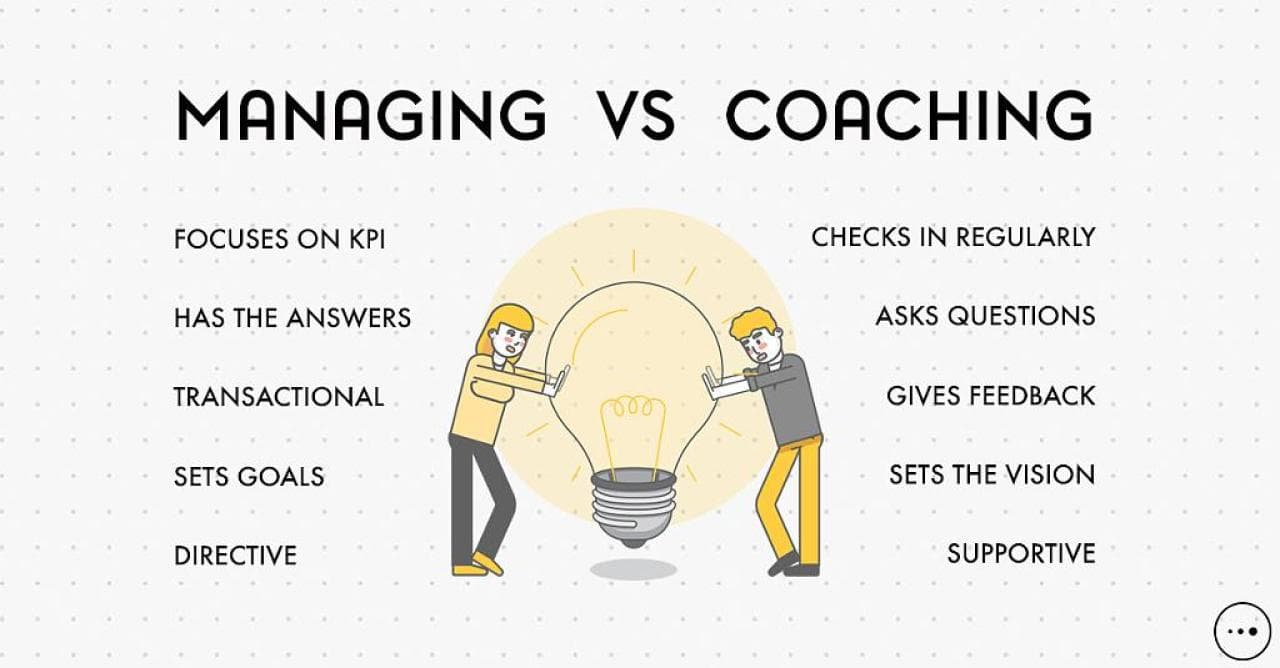
To be clear, the roles and sets of responsibilities of manager and coach are both vital for a successful sales organization. One is not necessarily better than the other, and sales leaders should be careful of shirking one role in favor of the other.
Instead, manager and coach both represent two sides of the same sales strategy: helping your sales team reach peak performance.
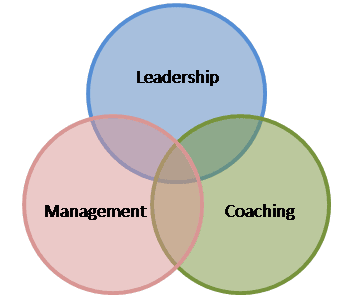
The primary goal of the sales coach’s activities is to motivate, empower, and draw from within the sales rep the ability to self-assess, self-direct, and self-improve.
Through hands-on, real-time observation, targeted coaching conversations, and timely insights, a sales coach can guide reps to:
- Identify, refine, and make habit of the specific behaviors that move the needle in sales conversations
- Correct or replace behaviors that have little or negative impact on the sales process
- Unlock their own potential to meet their goals
The focus of the sales coaching process should be encouraging the seller to look inward. It is not the coach’s job to do, say, or demonstrate any one particular thing; instead, the coach is tasked with asking questions and participating in conversations that empower sales reps to do their own individual work of identifying, improving, and optimizing themselves.
World-renowned sales coach Timothy Gallwey said it best: a sales coach’s job should be “helping [a sales rep] learn rather than teaching them.”
Why Sales Coaching Is Important
For some sales managers, it can be tempting to look over the to-do list and balk at the idea of adding one more thing to your plate. What makes coaching so much better or different from management, anyway?
It’s true that sales leaders are severely overworked, but don’t discard coaching as “just another thing.” Sales coaching is one of the best tools a manager could add to their belt, and can have dramatic impacts on your team’s morale, productivity, and bottom line.
Let’s look at some data to back this up. Data from the Sales Readiness Group shows that 65% of top-performing sales teams said their leadership spends 20% or more of their time on coaching activities.

According to Harvard Business Review, high-quality sales coaching can improve a team’s performance by a whopping 19%, regardless of the specific sales methodologies, workflow organization, or sales training your team has found success with.
One reason that sales coaching is so impactful is that it often addresses “soft skills” — that is, skills that can’t necessarily be taught in a workshop or other form of training program.
Soft skills, rather, are those that are learned through time, practice, and (ideally) with the guidance of a mentor or coach.
Aside from developing soft selling skills, coaching has a number of other benefits that will help your team. Take a look:
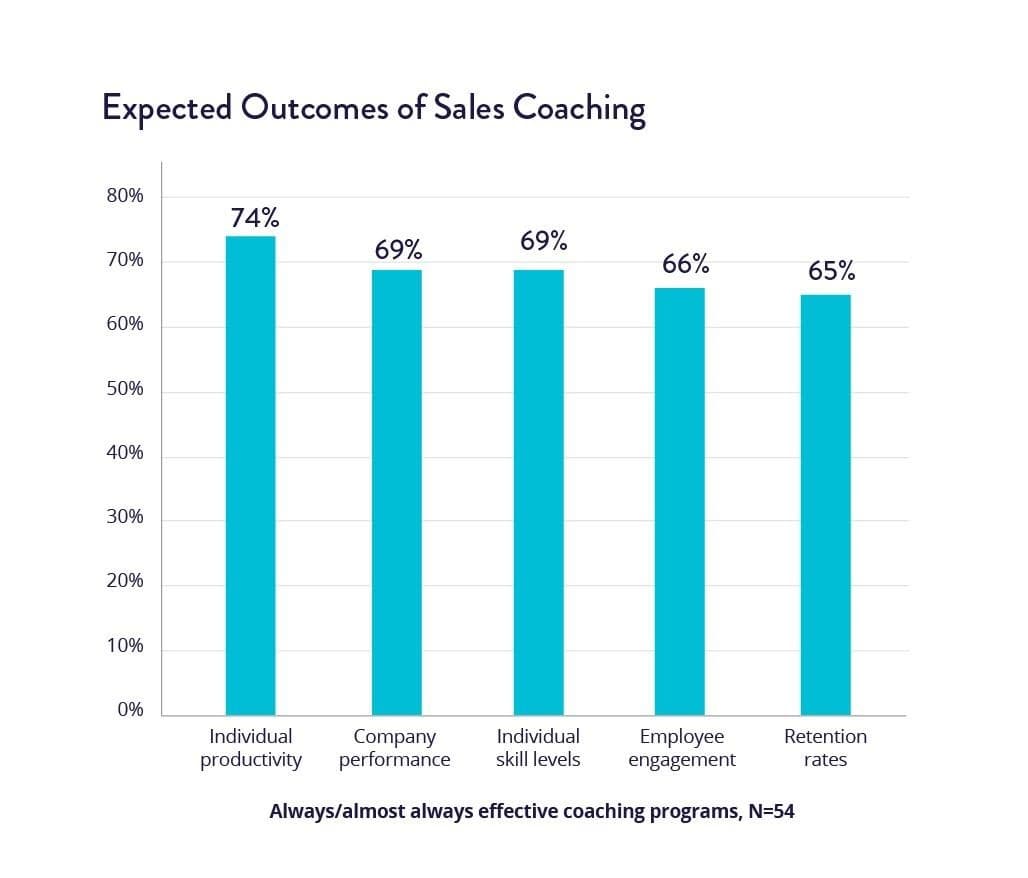 Let’s break down a few of the big ones.
Let’s break down a few of the big ones.
Improves Retention
The best sales reps prefer to work on high-performing teams. They’re also much more likely to stay with an organization that invests into them.
Recent research into sales coaching saw 65% of respondents report an increase in employee retention when they implemented a coaching program.
The importance of this cannot be overstated — The Bridge Group reports that average tenure for a sales rep has decreased from 3 years to a mere 1.5 years. This is an alarming statistic, as the best client relationships are developed from long-term territory management. Great coaching helps keep employees on board, motivated, and invested in their territories.
Levels up the Team
Although sales coaching focuses on strengthening each individual rep, it will also put the team as a whole on an upward trajectory.
With a good coach, more of the team meet their quota.
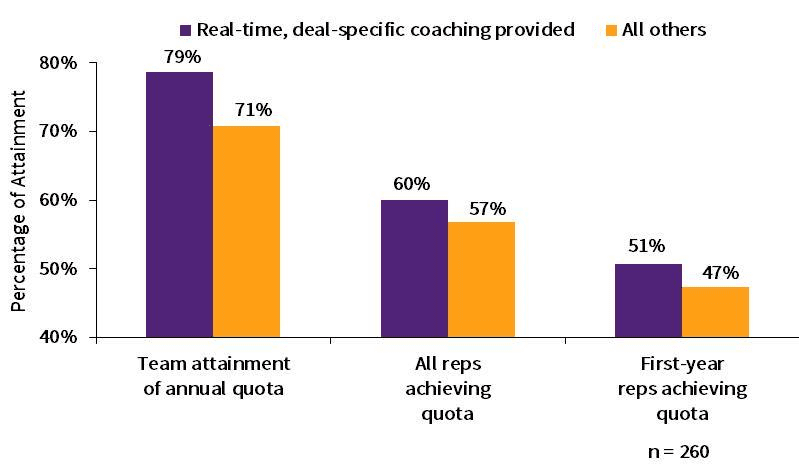 A solid sales coaching program means that no one slips through the cracks. The entire team will benefit from the coach’s learning about and sharing best practices as they’re observed within coaching conversations.
A solid sales coaching program means that no one slips through the cracks. The entire team will benefit from the coach’s learning about and sharing best practices as they’re observed within coaching conversations.
Creates Self-Motivated Reps
Sales coaching is a long-term investment; it may require a considerable investment of time, effort, and perhaps even capital to implement an effective program.
That being said, the ROI you’ll see from coaching your reps to become self-motivated, driven-from-within sales leaders is virtually immeasurable.
Sales coaching, if done correctly, creates sales reps who are constantly self-improving. Effective coaching creates an environment where mistakes are opportunities for growth, and where team members feel supported and excited to take responsibility for their own performance.
The impacts of this kind of constant improvement loop are profound, and will absolutely have effects in all aspects of your team’s performance.
How to Know When Your Team Needs Sales Coaching
The sooner you can implement a sales coaching program, the better off your entire team will be. Remember, coaching is a continuous process; there is no right or wrong time to start coaching, and those in a coaching role should always be ready for new opportunities to guide the reps the work alongside.
The sooner you start, the sooner you will start seeing results.
That being said, there are a few key signals that indicate a more urgent need to start honing your coaching skills and implementing them within your team.
Lackluster Performance From Sales Reps
If you’re noticing subpar performance from your sales reps — be it lack of attention to detail, underwhelming productivity, or other more significant problems — coaching will help.
Because coaching is all about meeting reps exactly where they are in their current level of performance, the shift from subpar to excellent can be achieved quickly.
Falling Short of Goals
It can be a tough pill to swallow when your sales team doesn’t meet goals. It’s tempting to play the blame game, but keep in mind that most reps are typically doing the best they can with the tools they have.
Often, a coach’s perspective will help reps stop spinning their wheels, and turn the cogs that will make a difference. Coaching allows reps to determine for themselves what’s most likely to move the needle in their sales performance.
Weak Pipeline Metrics
If any particular aspects of your sales pipeline are not up to snuff, you should strongly consider sales coaching.
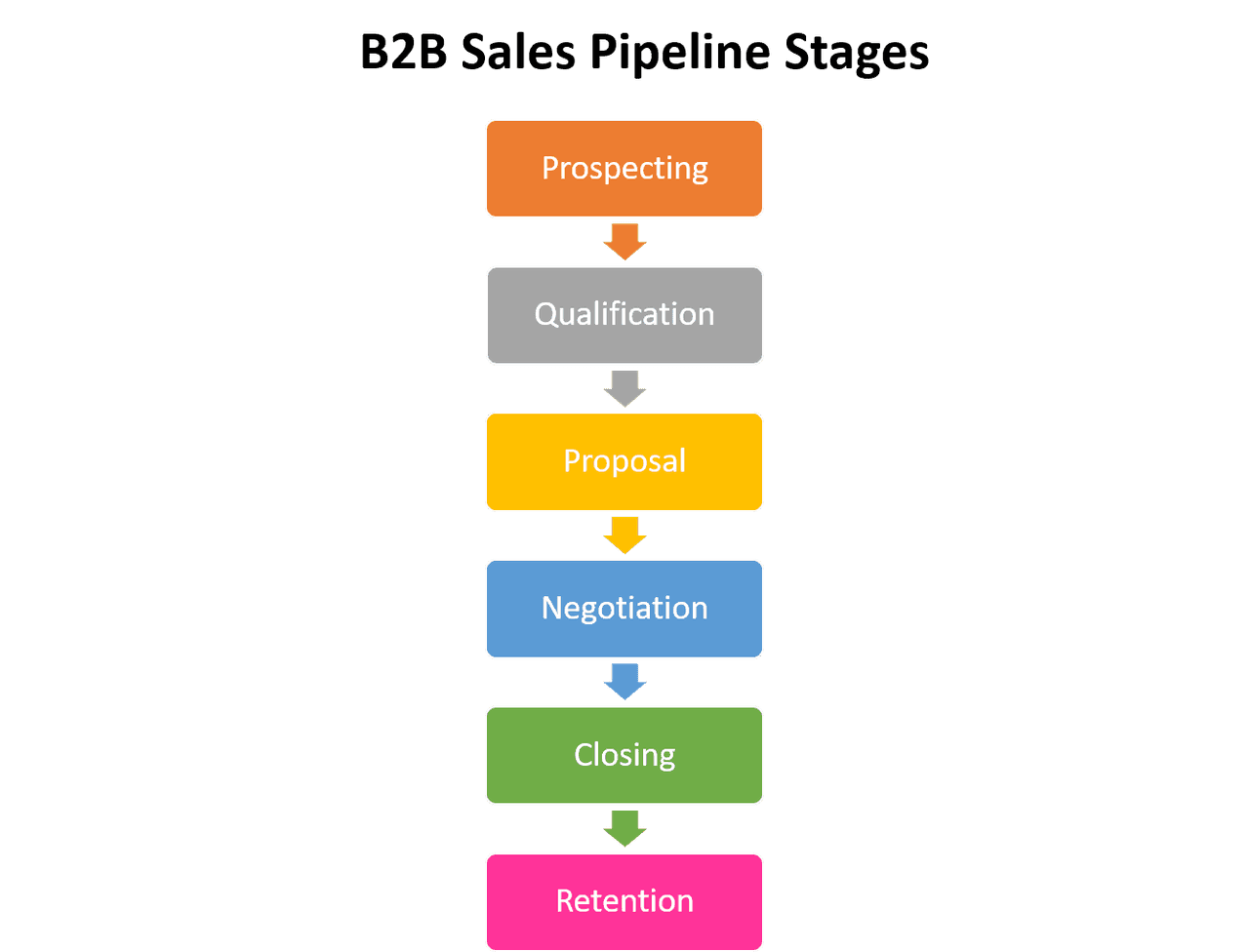
In particular, an abnormally long sales cycle is an indication that your team has some addressable inefficiencies in their current process that can be worked out with some coaching.
8 Sales Coaching Techniques to Help Your Teams Make Their Quotas
Many sales managers are reluctant to venture into sales coaching because they think the role is too involved, or requires an inordinate amount of training. Fortunately, that couldn’t be further from the truth.
There are many specific, tangible things that sales managers can implement immediately that will elevate them from the role of manager to that of coach.
Let’s have a look at some of the easiest and most impactful.
1. Make a Plan and Stick To It…
One of the cornerstones of effective sales coaching is a carefully considered plan. Sales managers looking to shift into the role of coach need to be well-versed in their company’s most important KPIs, as well as the specific goals of the sales team.
Here’s just one example of a sales coaching plan. Each company should create a plan that meets the needs of their specific team and organization.
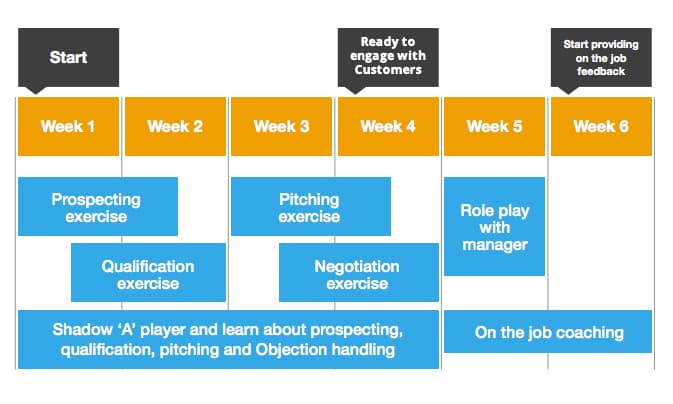
Coaches should also put in the time to make customized plans and targets for each individual rep.
2. …But Don’t Neglect Teachable Moments
As important as having a plan really is, it’s also critical that you leave room for teachable moments.
A big part of coaching is teaching on the fly and in the moment, so don’t cut yourself off from those for the sake of sticking to the plan. Coaching should be a mix of both.
3. Play Chess, Not Checkers
A great coach sees the bigger picture, and thinks several moves ahead. Whenever possible, take a proactive role rather than a reactive one.
4. Spend Time in the Field
Sales coaches need to be wherever their sales reps are. If the reps under their management are phone-based, coaches need to be listening in on calls. If their reps are out in the field, they need to be out in the field with them.
Sales coaching is not a “give me a recap” kind of position. It relies on real-time, in-the-moment analysis and feedback — no shortcuts.
5. Ask Open-Ended Questions
The best sales coaches know that open-ended questions are what generate the most meaningful answers.
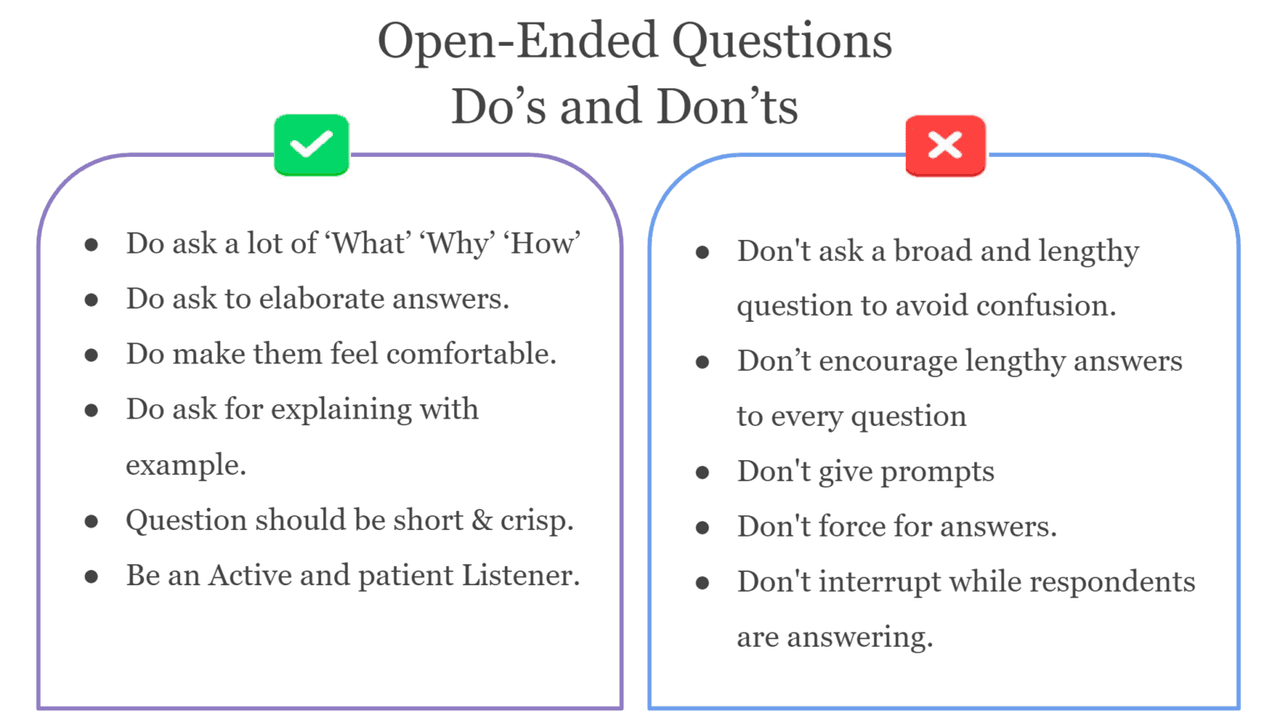
These kinds of questions can start to feel like an interrogation if asked without care; it’s important to have a trusting relationship with your reps in order for this strategy to be effective.
6. Learn the Art of Giving Feedback
Feedback comes in all shapes and sizes, and not all of it is good.
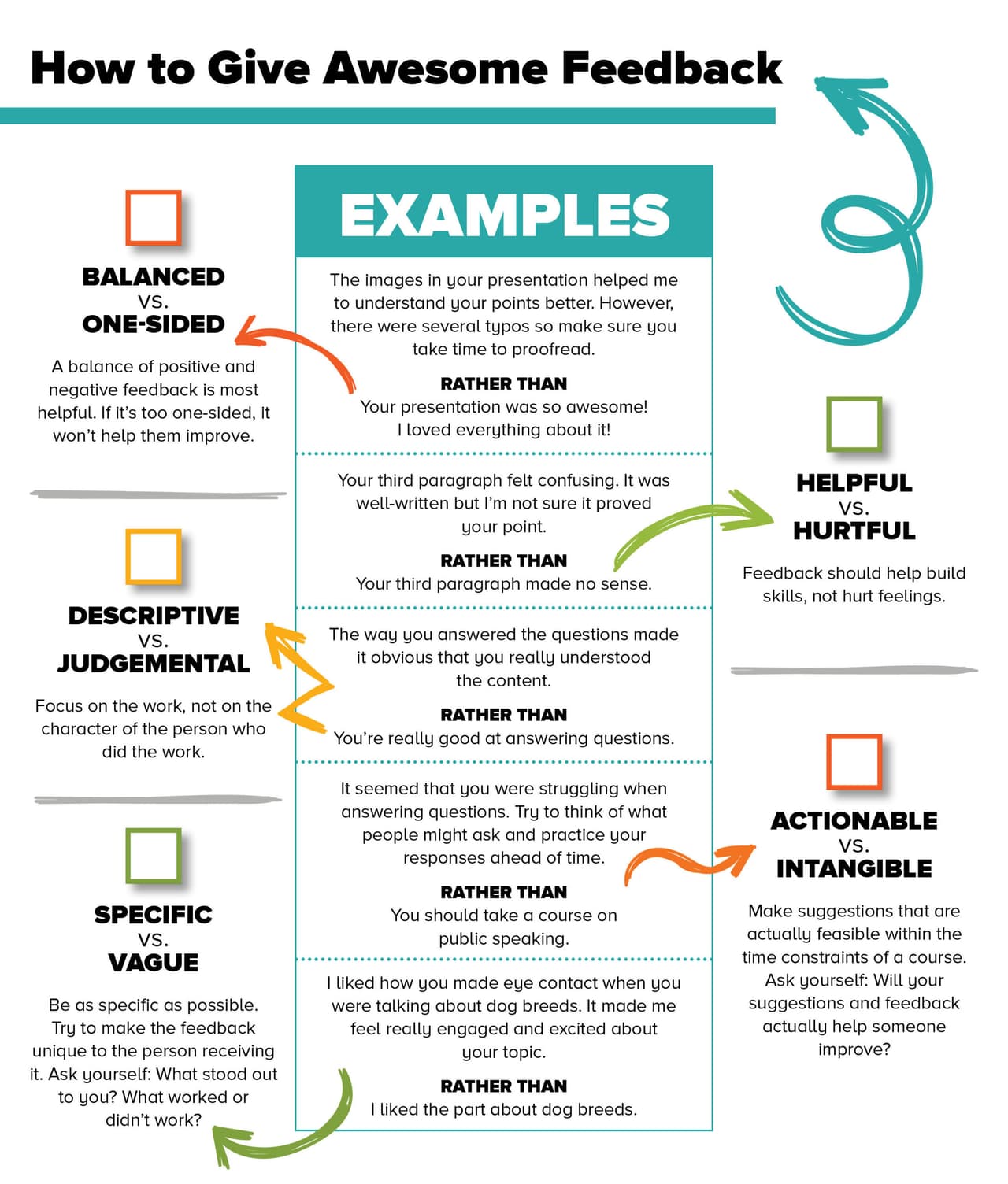
In fact, providing good feedback is actually a very delicate process. It needs to be timely, specific, and motivating (whether positive or negative), and should come after adequate reflection.
7. Focus On the Middle Tier
Although sales coaching truly is about reaching each and every individual rep, there is something to be said for targeting a specific subset of your salesforce.
When push comes to shove, the most important reps to target are those in the middle.
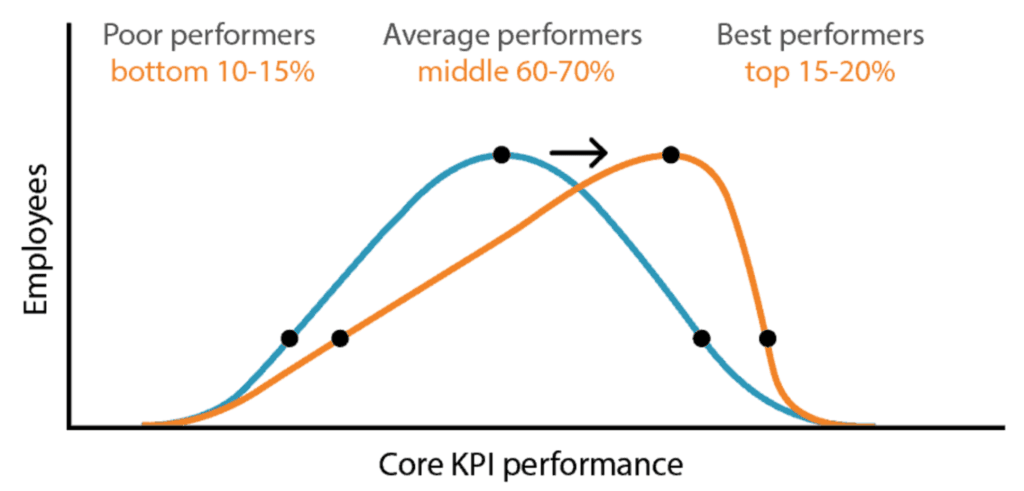
If you aim to improve the middle 60% of your salesforce, the entire team will shift forward.
8. Use Software
Good news for sales coaches — there are a multitude of tools that can make this job easier.
Consider implementing coaching-specific software to improve your process. Gong, for example, automatically captures customer interactions across calls, meetings, and emails, so coaches can study them and provide feedback later.
Chorus.ai is another useful coaching tool, which analyzes the conversations of your top-performing reps and helps others replicate those strategies.
There are many other tools that may meet the needs of your coaching program.
How to Measure Your Sales Coaching
In order to measure how effective your sales coaching truly is, it’s critically important that you regularly collect and analyze data on your reps’ performance.
In particular, the following metrics can act as your “North Star” to help you determine how effectively your team is responding to your coaching efforts.
Rate of Promotion
This may seem superficial, but keeping a pulse on how many of your reps are promoted, and how frequently, will give you good insight into how well your coaching is working. Because coaching is all about motivating reps from the inside out, lack of promotion should be telling.
Rep Satisfaction
Here’s another metric that seems a bit superfluous, but when it comes to coaching, it counts. The happiest reps are the ones who are self-motivated and make progress of their own volition. If your reps are happy, chances are high that they are successful and intrinsically motivated.
Overall Pipeline Metrics
You will naturally have a pulse on the specifics of your pipeline. If any of those metrics are off, don’t panic — one KPI doesn’t paint the entire picture. But the overall beat of your pipeline will be a good indicator of how effective your coaching really is.
Things like quota attainment, individual deal size and profitability, and individual rates of retention and renewal are all good measurements of how strongly your reps are striving to meet their next targets.
How Yesware Can Help Your Team Exceed Sales Goals
Yesware is the all-in-one toolkit for sales professionals and sales teams.
Yesware not only provides your team with tools to help them sell easier (email templates, email campaigns, meeting scheduler, etc.), it also provides sales leaders with full visibility into the sales process.
The tool allows you to keep tabs on both productivity metrics (like the number of emails sent) and performance numbers (like how well your recipients engage with your content). Yesware’s Reporting shows you what’s working so you can scale performance across your team and accelerate results.
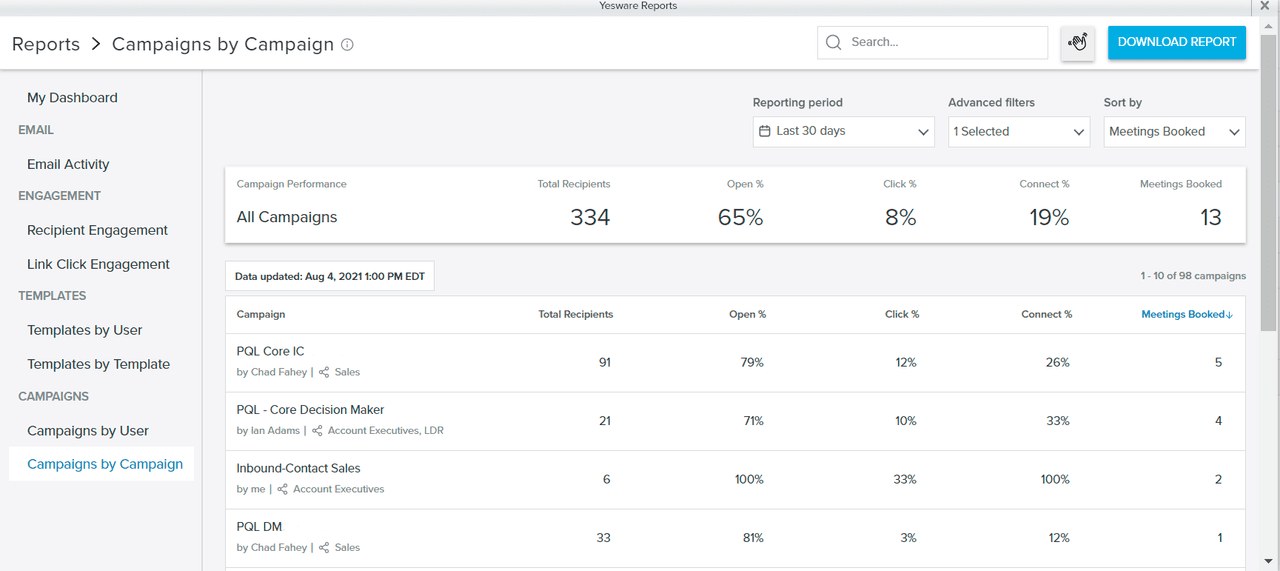
Sales coaching can be the difference between a great sales team and an outstanding one. Try one of the strategies outlined in this article to start your coaching program today.
Get sales tips and strategies delivered straight to your inbox.
Yesware will help you generate more sales right from your inbox. Try our Outlook add-on or Gmail Chrome extension for free, forever!
Related Articles
Casey O'Connor
Casey O'Connor
Casey O'Connor
Sales, deal management, and communication tips for your inbox

